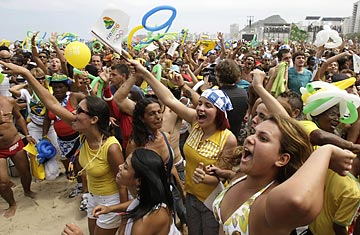
Residents celebrate Rio de Janeiro's victorious bid to host the 2016 Summer Olympic Games, on Copacabana beach in Rio on Oct. 2, 2009
"It is Brazil's time," President Luiz Inácio Lula da Silva insisted in his pitch before Friday's International Olympic Committee vote. "It is time to light the Olympic torch in a tropical country." The IOC agreed — and that lit up a frenzied carnival in Rio de Janeiro, a city that knows how to party perhaps better than any other. As the decision was announced, the world forgot Rio's problems for a moment, especially its frightening murder rate, and watched tens of thousands of its residents, known as Cariocas, exult on Copacabana Beach, dancing to deafening music in tanga bikinis and drinking Skol and Brahma beer around a massive banner that read, "Rio Loves You." "This will bring a lot of investment to Rio," said Andressa Gomes, 19, a student teacher who came to Copacabana to "cheer, pray and celebrate." Said Lindenberg Araújo, 62, a retired telecom engineer, "I am proud to be a Brazilian and a Carioca. This should bring us more security as well as a big party."
It is indeed Brazil's time — but not just because it was about time that the Olympics go the South American Way. In fact, there's a reason that it's been four decades since a Latin American country, or any Third World country, has hosted the games. That was the Mexico City Olympiad of 1968, when Mexico convinced the IOC that it was a modern republic ready to stand alongside Britain and Japan and Australia — only to have its army massacre hundreds of pro-democracy demonstrators 10 days before the opening ceremonies. The bar was set much higher for Latin America after that, meaning that a country would have to persuade the IOC that it could be a showcase for development as well as decathletes.
Brazil is widely regarded as the first Latin country to get there, and the IOC's selection is as much an endorsement of that achievement as it is of Rio's $14 billion bid to hold the games. The Nobel literature committee awarded Colombian author Gabriel García Márquez its prize in 1982 in part to affirm the global influence of Latin America's magical realist tradition. Now, giving Rio the Olympics sends a strong signal to the rest of the developing world that the Brazilian model — the post-ideological mix of orthodox market economics and progressive social policy championed by Lula — is the one to follow. "The IOC decision is an embrace of Brazil's practical way of doing things the past two decades," says Paulo Sotero, director of the Brazil Institute at the Woodrow Wilson Center in Washington, D.C. He adds that Brazil is the only country among the world's 10 largest economies today that hasn't hosted an Olympics.
Given its sheer size — a country just about as large as the U.S. and with a population of 190 million — Portuguese-speaking Brazil has always longed to project itself beyond the confines of Latin America. But, aside from soccer and Carnaval, the world has rarely taken Brazil as seriously. In fact, Brazil was long the butt of a joke that said it was the country of the future — and always would be. It was the only New World country to have a monarchy, which it abolished in 1889. That regal tradition spawned a quasi-feudal class system that made Brazil a stained paradise in the 20th century: a country with endless beaches, heavenly climate and sensual bossa nova culture, but also appalling poverty, social inequality and military dictatorship. By the 1980s, the country was mired in what Sotero recalls as fracassomania, an obsession with its failures.
But after the Cold War, Brazil finally started tapping its vast potential, first under President Fernando Henrique Cardoso (1994-2002) and since then under Lula, a former São Paulo metal workers union leader. As he told TIME in an interview last year, Lula, who is also head of Brazil's leftist Workers Party, channeled his skills and philosophies as a labor negotiator into a hybrid development policy that's about "doing things right" instead of right-wing or left-wing. By eschewing the ideological polarization that has paralyzed Latin America for centuries, he's helped forge one of the more successful examples of how developing nations can expand their underachieving economies while finally narrowing their often epic gaps between rich and poor. It has nurtured top-flight industrial giants like regional jet-maker Embraer, and 52% of its people are now in the middle class. And it is taking tentative but ever surer steps at asserting itself on the diplomatic front in global as well as hemispheric affairs.
Not that Brazil still doesn't have epic development problems to fix. Rampant corruption, violent crime, abysmal education and inadequate infrastructure are all urgent issues that Rio and Brazil alike have to address during the next seven years. Even Copacabana revelers like Gomes remember the holes in Rio's efforts when it hosted the Pan-American Games in 2007. "They didn't do all they said we would do and a lot of what they did do was left to rot after the games ended," she says, adding, "I think the elite will benefit from this more than most." Says Sotero: "The Olympics give us the challenge we need to keep on the right path."
By choosing Rio, in fact, the IOC is saying that, after the committee got burned 40 years ago by the Mexico tragedy, it's confident Brazil has matured enough to solve its headaches or at least keep them from adversely affecting the Olympics. Barack Obama reminded the IOC that Chicago is the "city that works." But Chicago lost out in large part because Lula could argue that, in Brazil, Latin America finally has a country that works. As a result, it's time to light the torch down South American Way.
